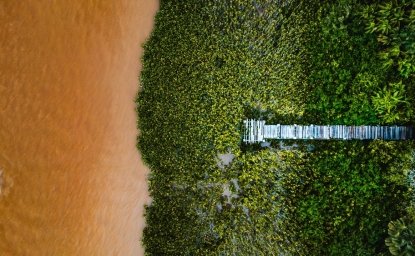Brazil, a country of continental proportion with large reserves of biodiversity and an extensive hydrologic system, has a complex environmental architecture with unique challenges. Brazil is home to 60 percent of the world’s largest rainforest, the Amazon. However, despite the forest’s importance as a biodiversity hub and a carbon sink, its deforestation levels are approaching a critical point of no return. If rainforest deforestation levels surpass this critical level, the region will experience severe drought and rain fluctuations with global impact potential. The Amazon is not the only Brazilian biome under threat. The Cerrado—a savannah that covers a third of Brazilian states—has lost 47 percent of its territory since the 1970s, and experienced more deforestation last year than the Amazon. These regions are important, and their protection or lack thereof has domestic and international consequences, such as the creation of a cycle of deforestation and drought, soil erosion, and loss of biodiversity; as well as amplifying climate change and its impacts. Environmental concerns also have social implications. In 2017, more environmental activists were killed in Brazil than in any other country in the world. In addition, threats to forest areas often threaten marginalized groups, such as family farmers and traditional populations.
Promoting reforestation and curbing illegal logging is part of Brazil’s plan to meet its nationally determined contribution as a signatory of the Paris Climate Agreement. However, environmental protection legislation faces pressures from diverse political interests, environmental and social concerns notwithstanding. The current administration has used the demarcation of specific conservation areas as a bargaining chip to negotiate with the bancada ruralista (agribusiness caucus), which represents a powerful interest group in Congress. Agribusiness is responsible for 23 percent of Brazilian GDP and the bancada ruralista approaches land protection from an economic perspective, viewing environmentalism as an obstacle to economic development. Their support for the expansion of the agricultural frontier into forest land creates friction with efforts to promote sustainable development and conservation.
Yet the bancada ruralista is not alone in this perspective. While the environmental movement has grown in Brazil in recent years, environmental issues rarely appear as a top concern for the electorate, which tends to prioritize social programs (44 percent), anti-corruption efforts (32 percent), and stabilizing the economy (21 percent). Although Brazilians agree that there is little guarantee of environmental protection and believe that it should be the government’s responsibility, there seems to be little popular pressure on the federal government to take action. Most citizens believe safeguarding the environment is the responsibility of the state or municipal government. Given the limited voter focus on this topic, presidential candidates may not need to elaborate proposals for addressing deforestation, sustainability, and other environmental issues.
Related Content
The Fight Against Deforestation in Brazil
Click here to return to Understanding the Issues.
Authors

Department of Government, Georgetown University


Brazil Institute
The Brazil Institute—the only country-specific policy institution focused on Brazil in Washington—aims to deepen understanding of Brazil’s complex landscape and strengthen relations between Brazilian and US institutions across all sectors. Read more






